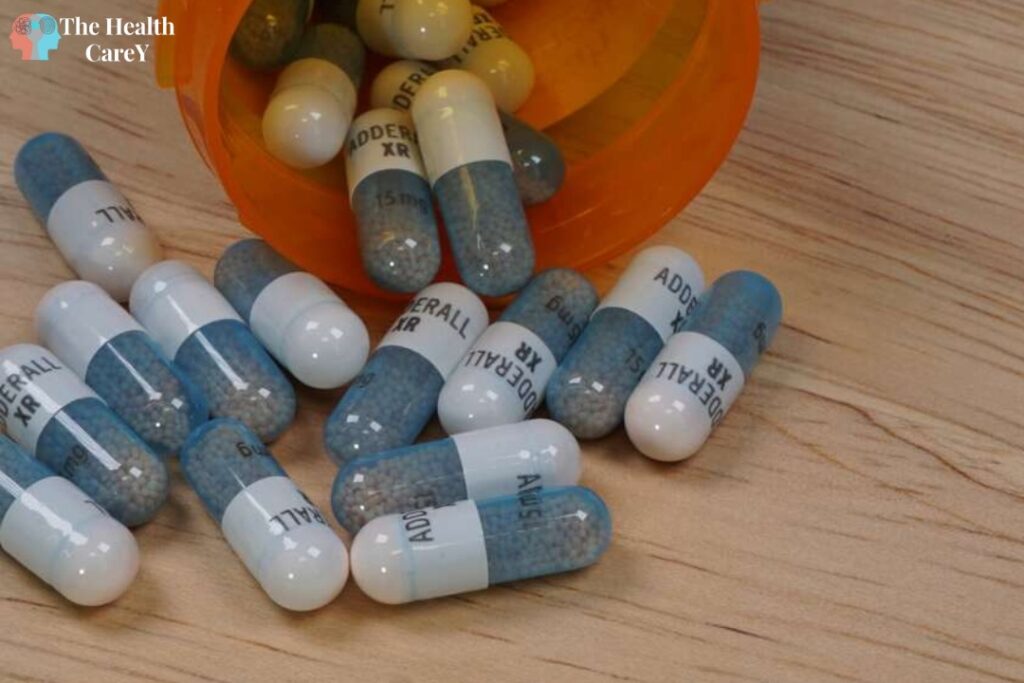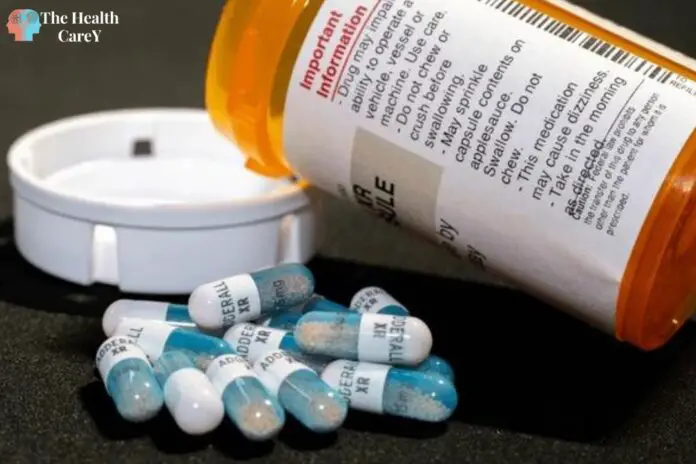If you’ve ever taken Adderall, you may have wondered how long it stays in your system. This is an important question, as the length of time the drug stays in your body can affect how you feel and how it may interact with other medications or substances. The answer to this question depends on several factors, such as your age, weight, and metabolism.
Adderall is a stimulant medication commonly used to treat attention deficit hyperactivity disorder (ADHD) and narcolepsy. It works by increasing the levels of certain neurotransmitters in the brain, such as dopamine and norepinephrine. The effects of Adderall can last for several hours, but the drug itself can stay in your system for much longer.
Understanding how long Adderall stays in your system can help you make informed decisions about when to take it and how it may affect your body.
What is Adderall?
Adderall is a prescription drug that contains a combination of amphetamine and dextroamphetamine. It is primarily used to treat attention deficit hyperactivity disorder (ADHD) and narcolepsy. Adderall works by increasing the levels of dopamine and norepinephrine in the brain, which helps to improve focus, attention, and alertness.
Adderall comes in two forms: immediate-release and extended-release. The immediate-release form is designed to work quickly, while the extended-release form is designed to work over a longer period of time. Adderall is a Schedule II controlled substance, which means that it has a high potential for abuse and dependence.
Adderall is a stimulant medication that can have both positive and negative effects on the body. Some of the positive effects of Adderall include increased focus, improved cognitive function, and increased energy. However, some of the negative effects of Adderall include decreased appetite, insomnia, and anxiety. It is important to use Adderall only as directed by a healthcare provider to minimize the risk of adverse effects.
How Long Does Adderall Stay in Your System?
Adderall is a medication that is commonly used to treat Attention Deficit Hyperactivity Disorder (ADHD) and narcolepsy. If you have taken Adderall, you may be wondering how long it will stay in your system. The answer to this question depends on several factors, including your age, weight, and metabolism.
The half-life of Adderall is approximately 10 hours. This means that it takes about 10 hours for half of the drug to be eliminated from your body. It can take up to three days for Adderall to be completely eliminated from your system.
However, the amount of time it takes for Adderall to be eliminated from your system can vary depending on several factors. For example, if you have a slower metabolism, it may take longer for the drug to be eliminated from your system. Additionally, if you take a higher dose of Adderall, it may take longer for the drug to be eliminated.
It is important to note that Adderall can be detected in your system through drug testing. The length of time that Adderall can be detected in your system depends on the type of drug test that is used. For example, Adderall can be detected in urine for up to three days after use, while it can be detected in blood for up to 12 hours after use.
In conclusion, the length of time that Adderall stays in your system depends on several factors, including your age, weight, and metabolism. It can take up to three days for Adderall to be completely eliminated from your system. Additionally, Adderall can be detected in your system through drug testing, and the length of time that it can be detected depends on the type of drug test that is used.
How Long Does 10mg Adderall Stay in Your System?
Adderall is a prescription medication used to treat attention deficit hyperactivity disorder (ADHD) and narcolepsy. It contains a combination of two stimulant drugs, amphetamine, and dextroamphetamine. When you take Adderall, it is absorbed into your bloodstream and distributed throughout your body. The drug is then metabolized by your liver and excreted from your body through your urine.
The amount of time that 10mg of Adderall stays in your system can vary depending on factors such as your age, weight, metabolism, and overall health. In general, the drug has a half-life of about 10 hours, meaning that half of the drug will be eliminated from your system in that amount of time.
After taking 10mg of Adderall, you can expect the drug to be detectable in your urine for up to 2-4 days. However, it is important to note that drug tests can detect the presence of Adderall for longer periods of time in some cases, especially if you have been taking the drug regularly or in high doses.
It is also important to note that Adderall can have different effects on different people. Some people may experience more intense effects than others, and some people may metabolize the drug more quickly or slowly than others. If you have any concerns about how long Adderall will stay in your system, it is best to consult with your healthcare provider.
In summary, 10mg of Adderall can stay in your system for up to 2-4 days after taking it. However, this can vary depending on individual factors, and drug tests may be able to detect the drug for longer periods of time.
How Long Does Adderall Stay in Your System After One Time Use
If you have taken Adderall for the first time, you might be wondering how long it will stay in your system. The answer depends on several factors, including your age, weight, metabolism, and the dosage of Adderall you took.
Typically, Adderall stays in your system for up to three days after a single dose. However, this timeframe can vary depending on several factors, including your body composition, hydration levels, and the frequency of use.
Additionally, the form of Adderall you took can also affect how long it stays in your system. For example, extended-release Adderall can stay in your system for up to three days, while immediate-release Adderall can last up to 24 hours.
It is important to note that Adderall can be detected in drug tests for up to three days after use. Therefore, if you are taking Adderall for a medical condition, it is essential to inform your doctor or employer of your medication use to avoid any misunderstandings.
Overall, Adderall can stay in your system for up to three days after a single use. However, the timeframe can vary depending on several factors, including your body composition, hydration levels, and the form of Adderall you took.
How Long Does Adderall Last?
Adderall is a prescription medication that is commonly used to treat Attention Deficit Hyperactivity Disorder (ADHD) and narcolepsy. It contains a combination of amphetamine and dextroamphetamine, which are stimulant drugs that affect the central nervous system.
The duration of Adderall’s effects depends on various factors, including the dosage, the individual’s metabolism, and the method of administration. Generally, the effects of Adderall can last between 4 to 6 hours for the immediate-release (IR) version and up to 12 hours for the extended-release (XR) version.
It is important to note that the duration of Adderall’s effects does not necessarily indicate how long the drug stays in your system. The drug can be detected in urine for up to 4 days, in blood for up to 46 hours, and in hair for up to 90 days after the last use.
It is also important to follow the prescribed dosage and not to exceed it, as taking too much Adderall can lead to serious side effects, including heart problems, high blood pressure, and addiction.
In summary, the duration of Adderall’s effects can range from 4 to 12 hours, depending on the version of the drug and individual factors. However, the drug can remain in your system for several days after the last use, and it is important to use the medication as prescribed to avoid potential side effects.
Factors That Influence How Long Adderall Stays in Your System
When it comes to determining how long Adderall stays in your system, there are several factors that can play a role. These include:
Dosage
One of the biggest factors that can influence how long Adderall stays in your system is the dosage you take. Generally speaking, the higher the dose, the longer the drug will stay in your system. This is because higher doses take longer for your body to metabolize and eliminate.
Frequency of Use
Another important factor to consider is how often you take Adderall. If you take the drug regularly, it can build up in your system over time, which can increase the amount of time it takes for your body to eliminate it. On the other hand, if you only take Adderall occasionally, it will likely be eliminated from your system more quickly.
Body Mass and Metabolism
Your body mass and metabolism can also play a role in how long Adderall stays in your system. If you have a higher body mass or slower metabolism, it may take longer for your body to eliminate the drug. Conversely, if you have a lower body mass or faster metabolism, the drug may be eliminated more quickly.
Age and Health
Finally, your age and overall health can also impact how long Adderall stays in your system. As you get older, your body may take longer to eliminate the drug. Additionally, if you have any health conditions that affect your liver or kidneys (which are responsible for metabolizing and eliminating drugs), it may take longer for the drug to leave your system.
Overall, there are several factors that can influence how long Adderall stays in your system. If you’re concerned about how long the drug will stay in your system, it’s important to talk to your doctor or pharmacist for more information.

Detection Periods of Adderall
– Urine Test: Adderall can be detected in urine for 2 to 5 days
– Blood Test: Adderall can be detected in blood for up to 46 hours.
– Saliva Test: Adderall can be detected in saliva for 20 to 50 hours.
– Hair Follicle Test: Adderall can be detected in a hair sample for up to 3 months.
What does adderall do? Effects of Long-Term Adderall Use
Long-term use of Adderall, a prescription amphetamine often used for ADHD and narcolepsy, can have several effects. It may affect your heart health by increasing blood pressure and heart rate. It could also impact your mental health, potentially causing anxiety, trouble sleeping, and mood changes. Furthermore, long-term use might lead to your body getting used to the drug, making you dependent on it, and increasing the risk of substance abuse.
How to Safely Remove Adderall from Your System
Here are some safe ways to get Adderall out of your system:
Drink water and stay hydrated. Being dehydrated can cause the drug to stay in your system longer. Drink plenty of water over a few days.
Eat a healthy, balanced diet. Eating foods high in fiber and protein can help speed up digestion and the removal process. Avoid fatty, sugary foods.
Exercise regularly. Light exercise like walking can help your body sweat out toxins faster. Don’t overdo it though.
Consider a detox drink or supplements. Some people use things like niacin, vitamin C, or activated charcoal supplements which are generally safe but check with your doctor first.
Give it time. It can take several days for Adderall to fully clear your system depending on dosage and individual factors. Be patient and let your body do its thing.
Most importantly, don’t try to purge or force it out. Let the removal happen naturally over time. Seek medical help if you’re feeling unwell during this period. Coming off any medication needs to be done carefully under a doctor’s supervision when possible.
Conclusion
In conclusion, the detection times for Adderall can vary significantly based on the type of drug test, dosage amount, and individual body chemistry and metabolism. In general:
– Urine tests: Adderall is typically detectable in urine for 2-4 days after last use.
– Blood tests: Adderall may show up in blood tests for around 2 days following last consumption.
– Hair follicle tests: Considered the most accurate for long-term use, Adderall can sometimes be detected in hair for up to 90 days after last taking the drug.
Factors like hydration level, body fat percentage, and frequency of use can influence how long Adderall remains present in the body. In general, it clears the system fastest from blood and slower from urine, saliva, and hair. Understanding average detection windows can help determine the timeline for potential drug tests.
Frequently Asked Questions
Q1. How long does Adderall stay in your system on average?
Q2. What factors affect how long Adderall stays in your system?
Q3. How long does Adderall XR stay in your system compared to IR?
Q4. How long does it take for Adderall XR to reach peak effectiveness?
Q5. What is the typical half-life of Adderall in the body?
Q6. How long can Adderall be detected in a urine test?
Also Read:





















